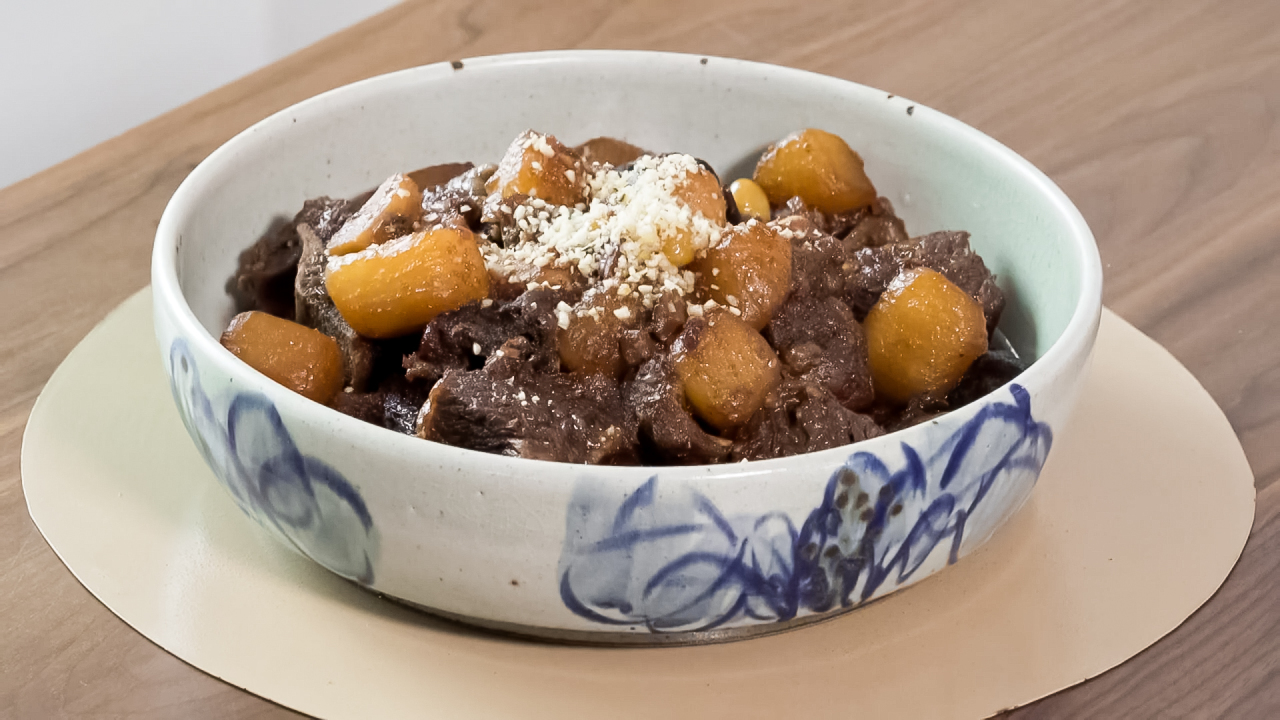[Diana’s Table] Galbijjim, Korean braised short ribs
By Korea HeraldPublished : Dec. 19, 2020 - 16:01

Galbijjim, or braised beef short ribs, is a very popular dish for special family dinners or holiday celebrations in Korea. It usually takes a long time to properly prepare this dish but it is an exceptional addition to the table to make for an abundant and special meal. My mother made this especially for my birthdays and I used to look forward to eating galbijjim more than the birthday cake.
I first learned to make galbijjim as a newlywed and it took a lot of trial and error over the years to develop this simple and easy recipe. Now this has become one of my signature dishes at our family dinners and celebrations. I hope that you will try your hand at making this dish over this holiday and enjoy the traditional taste of braised short ribs with your family and friends.
As with any recipe, it is essential to choose the right ingredients. And for this dish, it is very important to choose the right short ribs. They should have more meat than fat and it should be tightly attached to the bone. When seasoned, short ribs are chewier and tastier than other cuts of beef.
I usually start with 12 pieces of short ribs, about 5 centimeters thick. You should wash the ribs in cold running water and soak them for another 30 minutes to drain the blood. Then boil the short ribs in water for about 10 minutes to further remove the blood. Clean the ribs and the pot thoroughly to ensure that your seasoning is not mixed with other dirty residues. This will help to eliminate any unsavory aroma and will also help to keep the sauce clear and savory.
Ingredients:
10-12 pieces of short ribs, 5 centimeters thick
Marinade:
1 cup chopped green onions
1 cup soy sauce, Korean soy sauce is preferred.
3 cups water
2 tablespoons minced garlic
1 tablespoon minced ginger
1/2 cup rice wine
1/2 cup pureed Asian pear. If not available, can use pureed onion.
1/2 cup sugar
1 tablespoon of sesame oil
Pepper to taste
Vegetables:
6 pieces of shiitake mushrooms
8-10 whole chestnuts
8-10 whole dried dates
6-8 ginkgo nuts
1/2 large radish, cut into bite sized pieces
1 whole carrot, cut into bite sized pieces
First mix all the marinade seasoning (soy sauce, water, minced garlic, minced ginger, chopped green onions, sugar, pureed Asian pear and rice wine) and set it aside in a big bowl. In a large pot, mix seasoning with cleaned ribs, making sure that the seasoning liquid covers the meat. The short ribs should be boiled in the marinade mix until the meat is tender and feels soft to the touch. Add the mushrooms and dried dates first. Let it braise at medium high heat for about 40 minutes. Then you can add the radishes, carrots and chestnuts and braise them for another 30 minutes until all the vegetables have soaked up the seasoning. In the winter months and especially for the New Year table, I also add rice cakes and ginkgo nuts to add color and texture to the dish. Before serving, add 1 tablespoon of sesame oil and pepper to taste.
Galbijjim can be served on its own or with other Korean dishes. Sometimes, it is nice to serve it over a simple bowl of rice for weeknight dinners. Depending on regional recipes or personal tastes, some even add Korean chile flakes and chile paste to make it spicy. However, our family likes the traditional taste of soy sauce-based galbijjim. Although this recipe is for four people, I usually make a larger quantity. It can be made well ahead of time, and it actually tastes better after a few days. If you have any leftover sauce, you can add cut potatoes and carrots to make a new dish. It can also be frozen and used when you have unexpected guests for dinner.
Happy Holidays!
--

Diana Kang is a lifestyle content creator specializing in Korean food and food culture. She has worked as an executive producer of the PBS series on Korean food, “Kimchi Chronicles,” and has written regular columns on celebrity chefs, specialty ingredients and family recipes.
--Ed.
-
Articles by Korea Herald

















![[KH Explains] Hyundai's full hybrid edge to pay off amid slow transition to pure EVs](http://res.heraldm.com/phpwas/restmb_idxmake.php?idx=652&simg=/content/image/2024/04/18/20240418050645_0.jpg&u=20240418181020)

![[Today’s K-pop] Zico drops snippet of collaboration with Jennie](http://res.heraldm.com/phpwas/restmb_idxmake.php?idx=642&simg=/content/image/2024/04/18/20240418050702_0.jpg&u=)